MCCQE Part 1: Effective Time Management
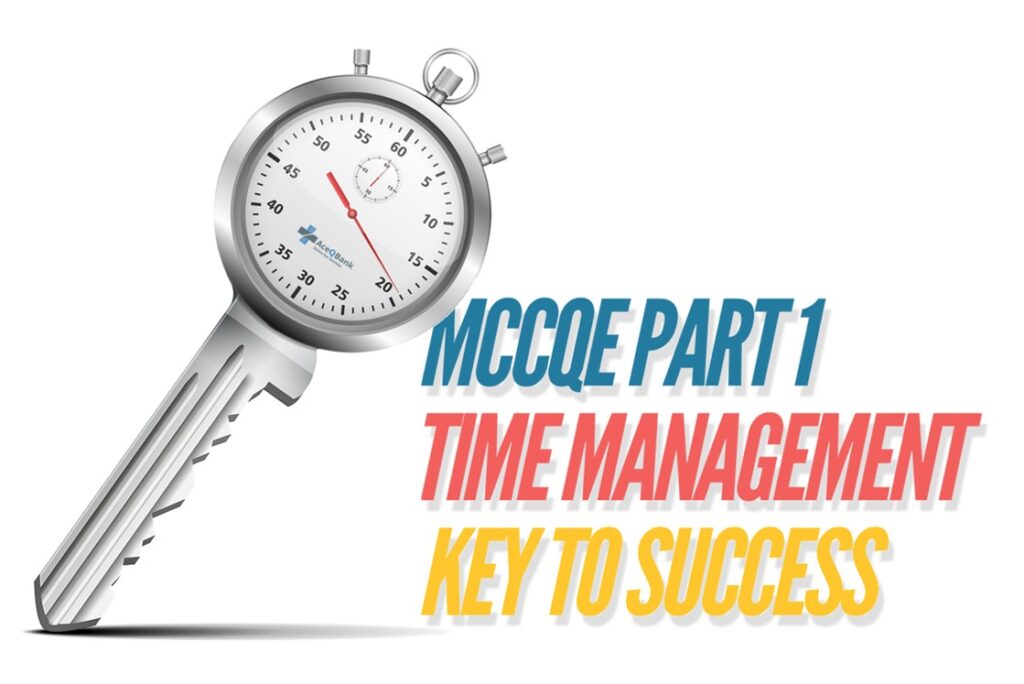
- Overview of the MCCQE Part 1
- What Is The Effective Time Management?
- Why Is MCCQE Part 1 Time Management Important?
- What Are the Benefits of Time Management?
- Main Parts Of Time Management For MCCQE Part 1
- MCCQE Part 1: Tips for Improving Your Time Management
- How Can Ace Qbank Help With MCCQE1 Time Management?
- How To Maximize Your Success on the MCCQE Part 1?
Effective time management is crucial when taking the Medical Council of Canada Qualifying Examination (MCCQE) Part 1 exam. To achieve a high score, it is imperative to have a thorough understanding of the Medical Council of Canada (MCC) objectives and exam format and to be able to efficiently manage your time throughout the test.
Assessment of clinical knowledge and competencies is the main objective of the MCCQE1 exam, which is taken by medical students and graduates from Canada and other countries around the world. Candidates who are able to correctly answer a higher number of questions and clinical cases within the allotted time will have a greater chance of passing the examination.
Are you struggling to answer all the questions within the time limit and aiming to ace the MCCQE Part 1 exam on your first attempt? Look no further; this blog post is tailored for you! Effective time management is critical for success in high-stakes exams, and the Canadian Qualification Exam is no exception.
One of the key components to success on the MCCQE1 exam is effective time management, which can make all the difference between passing and failing. Later on, we will explore how effective time management can help you boost your score on the exam, the benefits of managing your time efficiently, and some tips to help you manage your time during the exam.
Overview of the MCCQE Part 1
There has previously been a discussion on the format of the exam. In order to fill individuals who have stumbled upon this blog in on the latest information, the MCCQE Part 1 is a step that must be completed to become a registered independent physician in Canada. The computer-based exam takes place over one day and is designed to evaluate the candidate’s essential medical knowledge and ability to make clinical decisions.
Orientation for the Exam
When you are preparing to take the Medical Council of Canada Qualifying Examination Part 1, it’s essential to understand what the exam entails. While having a fundamental knowledge of medicine is undoubtedly important, the truth is that it has low priority in this exam.
The primary focus of the exam is to evaluate your ability to apply clinical knowledge to real-world scenarios. Therefore, it’s essential to sharpen your clinical reasoning skills and develop a sound understanding of the application of medical knowledge in practical situations.
The exam questions will be similar to clinical vignettes, which are real-world situations physicians often encounter daily. These vignettes will require you to analyze the clinical scenario, synthesize the information, and select the best course of action from a list of possible options. Therefore, it’s essential to be proficient in clinical reasoning and problem-solving skills to excel in the exam.
It’s also worth noting that this approach makes the exam more challenging. It requires you to think critically, analyze the situation, and apply your clinical knowledge to select the best course of action. However, this challenge is a good thing. It ensures that only the best and brightest candidates pass the exam and that Canada’s medical practitioners are among the best in the world.
Role Of MCC Objective In The Exam
The other thing worth mentioning here is that all questions and clinical cases in the MCCQE1 exam are developed according to the MCC objectives, which are congruent with the Canadian Medical Education Directives for Specialists (CanMEDS) role. The MCC objectives provide a guide for medical graduates entering residency in Canada, as they form the core of the multiple-choice questions and clinical cases featured in the exam.
In addition to evaluating a candidate’s ability to apply clinical knowledge to real-world scenarios, the Medical Council of Canada Qualifying Examination Part 1 also tests their familiarity with diagnostic criteria, therapeutic measures, and the latest Canadian guidelines, recommendations, and preventive medicine.
This knowledge is a significant advantage for candidates as it helps them navigate the clinical vignettes presented in the exam more easily and accurately. In fact, the clinical orientation of the exam is one of the primary reasons why experienced international medical graduates with years of clinical experience prefer to take the MCCQE1 exam.
By drawing on their expertise, these candidates can confidently apply their knowledge to complex clinical situations, providing the most appropriate and effective course of action. However, familiarity with Canadian guidelines and recommendations ensures that candidates are up to date with the latest standards of care in the country and where Canadian medical graduates shine.
MCCQE Part 1 Exam |
It is more challenging since it is clinically oriented and requires clinical reasoning, problem-solving skills, and test-taking strategies. |
The exam’s multiple-choice questions and clinical cases are based on the Medical Council of Canada’s (MCC) objectives and in accordance with CanMEDS roles. |
The examination is given over the course of a single day, and candidates have the option of taking it either in person or online. |
It is divided into two sections, clinical case scenarios and multiple-choice questions, to assess a candidate’s medical knowledge and clinical decision-making ability. |
To maximize success, it is important to create a study plan, use Canadian Qbank to cover the MCC objectives properly and work on your time management. |
Administration Of The Exam
The exam is typically administered in a single day and allows candidates to take it in person or through an online platform.
For those who prefer the traditional method, the in-person test is conducted at Prometric centres across Canada and other countries with Prometric centres for Canadian qualification exams. The Prometric centres offer a secure and controlled environment that provides candidates with the necessary infrastructure to take the exam with ease and confidence. Moreover, candidates can interact with the examiners and receive support and guidance throughout the exam.
On the other hand, the online test offers a convenient and flexible option for candidates who cannot attend the in-person exam. The online test is administered remotely, allowing medical graduates to take the exam from the comfort of their homes or any other location with a stable internet connection. This option is especially useful for candidates who live in remote areas, have mobility issues, or have other commitments that make attending the in-person exam challenging.
MCCQE1 Format
The exam is divided into two sections, namely clinical case scenarios and multiple-choice questions (MCQs), both of which are equally important in evaluating a candidate’s medical knowledge and clinical decision-making ability.
The MCQs, which form an integral part of the examination, are designed to assess a candidate’s medical knowledge. It has 210 MCQs, which are not categorized into sections and are meant to be answered independently, one after the other. Each MCQ question has five answer options, with only one option being the correct answer. As a result, candidates must exercise caution and read each question carefully to avoid choosing an incorrect answer. The examination is timed, and candidates have approximately 3.5-4 hours to complete the MCQ section.
The clinical case scenarios component, on the other hand, assesses a candidate’s clinical decision-making ability and selection of appropriate medical interventions. This component contains 38 cases with short-menu questions and short-answer questions, totalling between 65 to 75 questions. Candidates have up to three and a half hours to complete this component, and it typically follows the MCQ section in the afternoon.
Read more about the MCCQE1 Format
MCCQE1 Exam Preparation
Success on the MCCQE Part 1 exam is an important step towards achieving licensure as a physician in Canada. It is crucial to thoroughly understand the MCC objectives covered in the exam and be familiar with the exam format to prepare properly for it. By developing a study plan and devoting adequate time to preparation, you can optimize your chances of success when taking the exam. With proper preparation, you will be one step closer to becoming a licensed independent physician in Canada.
However, preparing for the MCCQE part 1 is a challenging process that requires undivided attention and an understanding of the objectives of the MCC. It is essential to create a study plan and follow it diligently. An effective strategy for the exam preparation would first involve understanding the format of the exam and scoring system, covering the MCC objectives properly by the practice of questions using a trustworthy MCCQE1 question bank in conjunction with available Canadian textbooks for the exam.
Finally, in addition to the MCC objectives, exam format, and use of Canadian Qbank, there are test-taking strategies that can be used to maximize the odds of success. One of the most crucial strategies is to prepare for the exam in advance; the other is excellent time management, which will be discussed in depth later.

What Is The Effective Time Management?
Time management during the qualification exam is an essential skill in order to ensure success. It is the ability to use your available time effectively in order to maximize efficiency and achieve desired results. This includes the ability to prioritize answering over re-reading the questions, flagging questions and staying focused throughout the exam. It also involves learning how to manage distractions and control stress levels. With effective time management skills, you can maximize the number of questions and clinical cases they can answer in the limited time frame of the exam.
The time management discussion for the MCCQE Part I exam is often divided into two distinct approaches.
The first approach outlines efficient time management during exam preparation which involves breaking down the MCC objectives into manageable chunks, creating a realistic study plan, and assessing your study time accordingly. It is important to make a schedule that maps out the time you plan to spend on each topic and leaves room for review and revision. Breaking down the MCC objectives into manageable chunks also allows you to manage your time more effectively and focus more on the topics you need to improve on.
The second approach focuses on the aspect of effective time management during the examination. It is essential to prioritize answering questions accurately after the initial reading instead of repeatedly going through them. In cases where you are stuck, flagging the question and moving on to the next is preferred to prevent it from hampering your progress and disrupting your timing. Furthermore, staying optimistic and focused during the exam is imperative to maintain your pace.
Both aspects of time management, that is, during exam preparation and during the actual exam, are equally significant for candidates to perform well in the MCCQE1 exam. Managing your study time effectively during exam preparation enables you to allocate sufficient time to each topic while leaving enough time for revision and review. Whereas effective time management during the exam itself involves prioritizing answering questions correctly, flagging difficult questions, and staying calm to maintain your pace.
Mastering the art of effective time management will help you reduce the possibility of running out of time or feeling overwhelmed during the exam. Therefore, it is essential to understand and implement these strategies to maximize your performance and increase your chances of passing the exam.
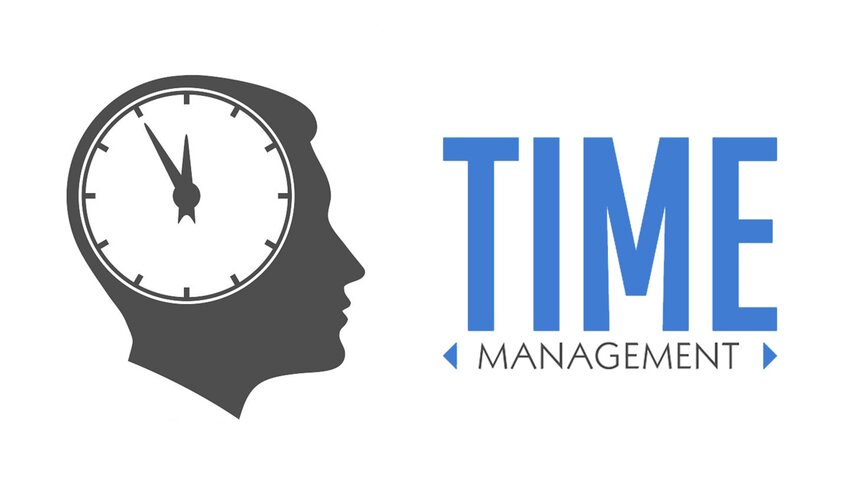
Why Is MCCQE Part 1 Time Management Important?
Passing the MCCQE Part 1 is an essential requirement for medical graduates who desire to practice medicine in Canada. The exam evaluates candidates’ clinical skills, competence, and medical knowledge in various fields, making it challenging. However, effective time management is a critical aspect that can significantly impact a candidate’s success in the exam.
One of the primary reasons why proper time management is vital for MCCQE Part 1 is the timed nature of the exam. With 210 multiple-choice questions to answer in four hours, candidates must manage their time well to complete the exam within the given time frame. Without proper time management, candidates may run out of time before answering all questions, which can negatively impact their scores.
Furthermore, the exam questions are clinically oriented, with complex scenarios that require candidates to read and comprehend them before answering. Proper time management allows candidates to prioritize their answers and avoid wasting time re-reading questions, which can lead to confusion and affect their accuracy.
Proper time management also helps reduce stress and anxiety, allowing candidates to focus better and perform optimally during the exam. When candidates manage their time well, they can confidently approach each question, knowing they have enough time to answer it correctly.
Consistent pacing, accuracy in answering questions, and avoiding careless mistakes and inaccuracies that could affect your scores are the keys to success. To keep track of your time and ensure that your timing and pace during your exams stay on track, you should develop an exam strategy that includes giving each question a specific amount of time and practicing the strategy in a timed study mode of question bank.
Proper time management, in turn, increases your likelihood of success, allowing you to approach the exam with greater confidence and less anxiety.

What Are the Benefits of Time Management?
Medical students have proven that they are capable of handling the rigours of medical school. Every year, however, students discover that they appear less competent when they prepare for and take the MCCQE1 exam.
This is because the exam requires more than just textbook reading and memorizing topics. To pass the qualification exam, students must have long-term retention of the material, problem-solving abilities, and the right test-taking strategies. One of these strategies is time management during the exam, which is essential for success.
Effective time management is the ability to use your time effectively in order to achieve maximum efficiency and the number of questions you can answer in the limited time frame of the exam. This includes being able to prioritize, learning how to manage distractions and controlling stress levels.
One of the most important benefits of proper time management is that it helps you practice focusing on what’s important and finding clinical clues and relevant information in a timely manner. This allows you to answer multiple-choice questions on the exam quickly.
Proper time management is crucial to achieving success in this exam. Some benefits of MCCQE Part 1 time management are:
1. Improved efficiency:
One of the primary benefits of proper time management is that it enables you to use your time wisely, thereby ensuring that you can answer the majority, if not all, of the questions on exam day. This can significantly boost your confidence and performance during the exam and ultimately help you complete the test within the allocated time frame. By allocating sufficient time for each question, avoiding distractions, and staying focused, you can maximize your productivity and accurately answer questions and clinical cases. Therefore, it is essential to prioritize time management as a foundational skill for success.
2. Reduced stress:
Finding out that a large number of questions remain unanswered and knowing that, within the amount of time remaining, you can not answer all of them will make anyone anxious and knock anyone’s concentration and accuracy off. Thus, to avoid this, it is recommended that you manage your time effectively during the exam.
When you know how to use your time well during an exam, your confidence goes up, and your anxiety and nervousness go down because you know you have enough time to answer all the questions. Effective time management during an exam also allows you to review your answers and catch any mistakes you may have made, leading to a better overall performance.
By developing and practicing this test-taking strategy, you can confidently approach exams, knowing you can tackle each question within the allotted time.
3. Better performance:
Poor time management can lead to rushed answers, careless mistakes, and ultimately selecting the wrong answer, which results in lower scores if not retaking the exam.
On the other hand, a well-planned approach to time management allows test-takers to work through questions calmly and thoroughly, reducing anxiety and improving confidence.
Proper time management can help you prioritize which questions to answer first based on their point value or difficulty level, which can result in answering more questions with confidence while preventing rushing through questions, careless errors, and inaccuracies.
Additionally, good time management skills can also help reduce stress and anxiety during the exam, allowing you to maintain focus and perform at your best. It is important to practice time management techniques during your preparation for the exam to ensure success on test day.
Candidates can fully demonstrate their knowledge and skills by managing their time effectively, resulting in better exam performance.
4. Increase the chance of success:
It goes without saying that answering the majority of the questions on any exam will result in passing the exam. This is especially true for the MCCQE1 exam, where proper time management is key to having ample time to answer all the questions. By using effective time management strategies, you can ensure that you are able to answer most, if not all, of the questions and clinical cases on exam day and increase your chance of success.
In order to do well on the Canadian qualification exam, you need to be able to manage your time well. It is critical to remember that proper time management is a process that can only be mastered through regular practice.
However, effective time management can boost your performance significantly. If you put in the right amount of effort and determination, practice strategies, review the content ahead of time, and set priorities; you can make the most of the limited time you have to answer the questions.
Main Parts Of Time Management For MCCQE Part 1
Time management is critical for any medical professional preparing to take the MCCQE Part 1. Mastering it involves two essential components:
- Thorough preparation
- Implementation of strategies
The preparation part includes prioritizing coverage of the MCC objectives, identifying challenging medical concepts and addressing them comprehensively, estimating realistic time requirements, and setting attainable deadlines. This will ensure that candidates clearly understand the material and can make the most of their time during the exam.
The second component is implementing test-taking strategies. This includes executing well-thought-out plans to complete the exam within the allotted time and making necessary adjustments to ensure all questions are answered within the time limit. By employing these two critical components, candidates can increase their chances of success and achieve their desired results.
Achieving success on medical board exams is not easy, but it is attainable with diligent practice and preparation. It takes dedication and commitment to excel in this highly competitive field, and by managing your time wisely and having the right test-taking strategies, you can maximize your potential and gain the best results possible.
Don’t forget – you can also reach your goals by taking the necessary steps!
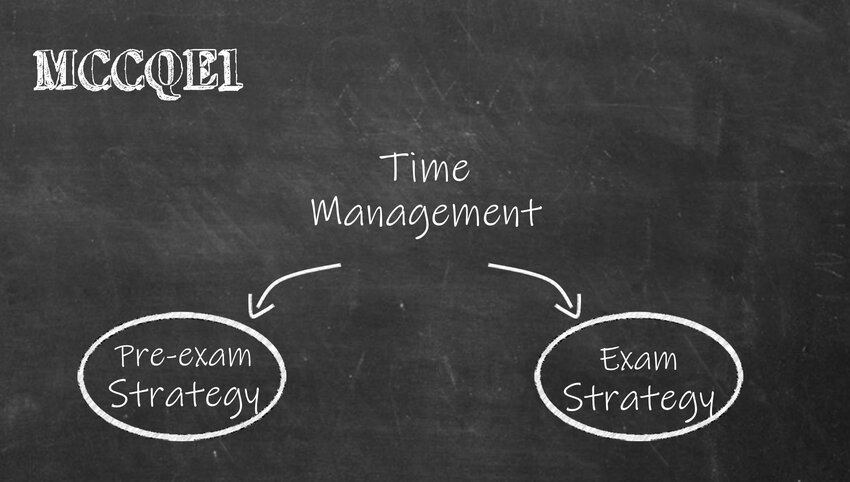
Time Management-Preparation for MCCQE1 Exam
Success as a medical student starts with this simple truth: you need to study and learn actively. It’s why developing an effective study plan is so important. It’s all about making sure you leave yourself enough time to successfully finish studying, determining which objectives should be your top priority, and setting up a schedule that works best for you.
It is crucial to ensure that your study plan is both realistic and achievable, as this will prevent you from becoming overwhelmed or disheartened. By carefully managing your time and staying focused on properly covering MCC objectives, you can increase your chances of success on the MCCQE1 and advance your career in the medical field.
Once you have created a study plan, the next step is active learning, which means engaging with the material and actively working to understand it. In other words, use a Canadian question bank to practice the objectives you have learned. This means engaging with the MCC objectives and actively working to understand them.
Active learning is more than just utilizing a Qbank to become familiar with the exam format and question types. It includes engaging in practice questions and reviewing the explanations thoroughly to deepen your understanding of the MCC objectives tested on the exam and also taking the MCCQE1 self-assessment to assess your progress and identify the objectives that need your attention before the actual exam.
This approach will help you retain information better, improve any weaknesses and increase your chances of passing the exam.
The following are the main components involved in the preparation part of effective time management:
- Creating a study plan
- Using a question bank
- Covering The MCC Objectives
- MCCQE1 self-assessment
Creating a realistic study plan for MCCQE part 1:
Proper time management is essential for success in any educational endeavour, and the first step is creating a realistic study plan. A good study plan should include a comprehensive overview of the objectives you need to cover, a timeline of when you will complete them, and a breakdown of how you are going to approach each objective. It should also include which study materials and resources you are going to use, how you plan to review them, and how often you plan to review them.
For example, if you are studying for the MCCQE Part 1, you should create a plan that outlines which objectives you need to cover when you plan to cover them, and how you plan to approach each objective. You should also decide which study materials and resources you will use, how you will review them, and how often you will review them.
Creating a realistic study plan is the first step to effective time management. With a well-thought-out study plan, you can ensure that you are making the most of your time and that you are studying effectively.
Using Canadian Qbank for MCCQE1 Exam:
Numerous studies have shown that active learning enhances retention and performance and that candidates who participate in active learning activities score better on exams and have a better understanding of the concepts. That’s because active learning is a very effective learning approach that has significantly improved the engagement, retention, and performance of candidates preparing for qualification exams.
Active learning focuses on hands-on activities that encourage critical thinking and problem-solving. It engages candidates preparing for the exam actively in the learning process through hands-on activities that encourage critical thinking, problem-solving, and analysis.
By using a question bank to prepare for qualification exams, you can take advantage of the benefits of active learning. Qbank provides a wide range of questions covering different topics and formats, allowing them to analyze, evaluate, and synthesize information. This approach helps you become familiar with the exam format, understand the types of questions that may be asked, and develop effective strategies to answer them.
In addition, Qbank’s in-depth explanation will help you identify gaps in your knowledge, allowing you to focus on understanding difficult concepts and reinforcing what you already know.
Using a question bank not only improves retention but also boosts overall performance on the exam.
Ace QBank is the best Canadian question bank available to assist you in preparing for MCCQE part 1. This Canadian question bank is designed based on the MCC objectives, and it has many unique features that make it the perfect Qbank for MCCQE1 exam preparation.
Ace Qbank helps you become familiar with the exam format, understand the different types of questions, and develop strategies to answer them. It also helps you identify any gaps in your knowledge and focus on understanding difficult medical concepts.
Ace QBank is a trusted and reliable platform designed for candidates preparing for the MCCQE1 exam. Its continuous updates and comprehensive resources offer an unparalleled learning experience, making it the best choice for exam preparation. Qbank platform is easy to use and provides users access to high-quality questions, detailed explanations, and performance analysis tools, ensuring they are adequately prepared to tackle the exam.
Ace QBank’s commitment to providing up-to-date and accurate information makes it an indispensable tool for candidates who are serious about passing the MCCQE part 1. Candidates preparing for the exam can have the confidence that they are investing in a high-quality exam preparation resource by choosing Ace QBank.
Properly Covering The MCC Objectives:
It is crucial to completely cover all MCC objectives when preparing for the MCCQE Part 1. This entails studying and frequently reviewing all objectives, understanding medical concepts, and practicing questions related to the objectives.
Paying extra attention to challenging medical concepts helps address any areas of weakness and ensures full preparation for the exam. By covering all MCC objectives with attention to detail and ample practice, one can increase their chances of success on the exam.
As healthcare professionals, it is our duty to approach our studies with a commitment to excellence and unwavering dedication to upholding the highest standards of medical practice. The MCCQE Part 1 exam is a significant milestone in our journey to becoming physicians, and passing it requires a comprehensive and diligent approach to MCC objectives.
Only through thorough preparation can we ensure we are ready to provide exceptional care to our patients and serve our communities to the best of our abilities.
Taking self-assessment before MCCQE Part1
Self-assessments are practice tests that simulate the format and content of a real exam. They are designed to help candidates assess their knowledge, identify areas of weakness, and prepare for the actual exam.
MCCQE1 self-assessments are important because they provide candidates with a sense of what to expect on the actual exam, help them understand how questions are framed, and allow them to practice time management and test-taking strategies.
By taking MCCQE1 self-assessments, candidates can identify areas that require their immediate attention and where they need to focus their study efforts and make adjustments to their study plans accordingly to address any weaknesses and convert them into strengths before sitting for the exam.
Ultimately, taking self-assessments can help candidates to increase their confidence, reduce anxiety, and improve their overall performance on the actual exam.
Time Management-Strategies for MCCQE1 Exam
The debate over the use of standardized computer testing to obtain board certification has been ongoing for years. Many physicians believe that the qualification exam is more a test of “test-taking skills” than of actual knowledge. While it is true that having an understanding of the MCC objectives is important, it is also important to have an advanced understanding of some of the test-taking “tips and tricks” that can help you succeed.
A well-prepared candidate will have both a deep knowledge of the exam material and a mastery of the test-taking strategies that can help them succeed. Mere comprehension of medical concepts is simply not enough; you need to thoroughly understand the testing process and the strategies to boost your performance and maximize your score.
Undoubtedly, the MCCQE Part 1 exam is challenging, but there are ways to help you give your best performance on test day. Two major categories of factors may influence your performance on the day of the exam.
Understanding the two main categories of factors that could affect your performance on exam day is crucial for success. You can manage these factors before and during the test using the right strategies. For instance, employ pre-MCCQE1 strategies while preparing for the exam to set yourself up for success and use MCCQE1 strategies during the test to keep your timing and speed in check. This way, you will be well-equipped to succeed on this major assessment!
Disclaimer:
The following suggestions were obtained after reviewing our proven strategies from past successes and failures, taking feedback from residents, and discussing with many medical students to develop a list of valuable strategies that you can use when stumped or befuddled. Let these pointers be your guide, but remember that the best answer will always come from your own knowledge, and this should never be seen as a definitive answer.
Pre-MCCQE1 Exam Strategies:
Before the exam, there are many factors that can affect a candidate’s performance. Most of these factors are well-known, and I am sure that the majority of you are acquainted with and know most of these factors, but they are worth mentioning, and then later on, we go through the factors that affect effective time management while taking the exam, which is the primary focus of this blog.
Factors that affect a candidate’s performance and potentially disrupt their time management before the exam are specific and personal for each candidate. However, the strategy to manage these factors is the same, and that is to simply prepare ahead of time.
Despite the fact that the majority of these factors are often managed with a little forethought and preparation ahead of time, any one of them has the potential of ruining the MCCQE Part 1 exam day for you, robbing you of the chance of success, and forcing you to retake the exam.
The worst part is that even if something unexpected interferes with your test-day performance, it will still count as an attempt rather than an exception. Thus, failing the MCCQE1 exam without a technical reason is considered a failed attempt, regardless of what happens on test day. Following is a list of possible sabotage points to be aware of:
Avoiding Cramming
Cramming is generally not a recommended studying strategy. It is a common misconception that cramming can be effective for retaining information for an upcoming exam. However, it leads to more stress and anxiety while decreasing the retention of information.
Instead, the most effective test-taking strategy is to “anticram.” This means that you should avoid waiting until the last minute to review MCC objectives and instead engage in consistent, spaced-out revision over a longer period of time parallel to your MCCQE1 exam preparation. This approach is more effective in retaining information, reducing stress levels, and increasing performance during the exam.
When you cram, you may memorize information for the short term, but it’s less likely to be retained in your long-term memory. This can lead to increased stress and anxiety levels leading up to the exam, which can negatively impact performance during the exam due to fatigue, confusion, and forgetfulness that stress and anxiety cause.
On the other hand, consistent study and spaced-out but frequent revision allow the brain to process and store information more efficiently and enhance recall. This is due to the brain’s ability to encode information into long-term memory through repeated exposure over time. By studying in this manner for the exam, you will be able to recall information more easily during the exam and feel more confident in your abilities.
So, if you want to perform your best on the exam and reduce stress levels, it’s best to avoid cramming and engage in consistent study and spaced-out revision instead.
Be on time:
It’s no secret that the day of an exam can be nerve-wracking, but one thing you can do to ensure a smooth testing experience is to arrive at the Prometric Test Center on time. The best is to arrive at least 30 minutes before your scheduled testing time to give yourself ample time to prepare and settle in before the exam.
To avoid any unnecessary stress or delays, make sure you bring all the necessary items with you, including your confirmation number, photo identification, and registration paper. These documents are essential for verifying your identity and ensuring that you are authorized to take the exam.
By arriving early, you’ll have enough time to check in, go through security procedures, and get settled before your test begins. This will also help you feel calm during the exam, which may improve your overall performance.
Arriving on time and being fully prepared will help you start your exam with confidence and minimize any unnecessary stress. So, make sure you set yourself up for success by planning ahead, arriving early, and bringing all necessary documents with you to the Prometric Test Center on your testing day.
Eat your Breakfast
“Breakfast is the essential meal of the day,” as the saying goes. This could not be more true, particularly on exam day. It’s critical to have a nutritious meal before taking your test if you want to perform well.
Eating breakfast before an exam can give your brain the energy and nutrients it needs to function at its best. The brain requires glucose to function, and breakfast provides a source of glucose that can help improve memory and cognitive function. As a result, candidates who eat breakfast perform better on exams than those who skip this important meal.
Furthermore, eating before an exam can help reduce anxiety levels. Hunger can cause irritability, fatigue, and difficulty concentrating, all of which can negatively impact exam performance. By eating a nutritious meal before your test, you’ll feel more satiated and less likely to experience hunger pangs, allowing you to focus on the task at hand.
It is important to remember that the quality of your meal is just as important as the act of eating itself. Go for full, nutrient-dense foods such as fruits, vegetables, whole grains, and lean protein sources. These foods will provide continuous energy without causing a surge in blood sugar levels. By eating breakfast, you’ll be setting yourself up for success on test day and giving yourself the best chance to achieve your academic or professional goals.
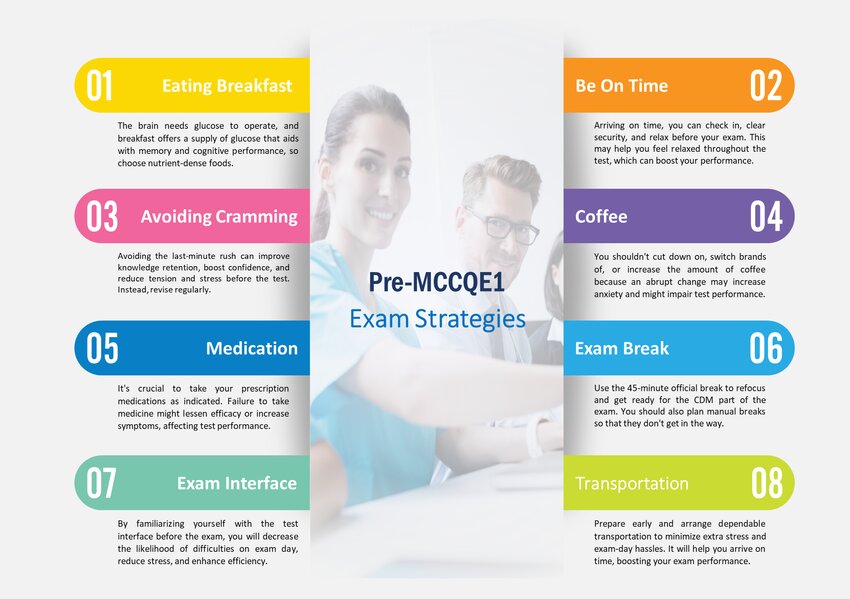
Drink your Coffee
Consistency is most important. You should neither change the amount or coffee brand nor stop drinking coffee just for the exam. If you regularly consume caffeine through coffee, it may be beneficial to drink the same amount of coffee on exam day as you do on any other day. This is because suddenly changing your caffeine intake can lead to withdrawal symptoms, which can negatively impact exam performance.
However, consuming too much caffeine can also have negative effects, such as increasing anxiety, causing jitters, and disrupting sleep patterns. Therefore, if you plan to consume coffee on exam day, it is important to consider your regular caffeine intake and limit consumption to a reasonable amount.
Caffeine can lead to dehydration; therefore, it’s also important to drink water throughout the day.
Take your Medication
Taking medication as prescribed is important for managing and treating medical conditions, and this can be especially important on exam day. For example, if someone has ADHD, hypothyroidism or anxiety, taking their medication as prescribed may help them better focus and manage their symptoms during the exam.
Failing to take medication as prescribed can result in reduced effectiveness of the medication or even worsening of symptoms, which can negatively impact exam performance. Additionally, missing doses of certain medications can result in withdrawal symptoms, which can also be detrimental to exam performance.
It is important to prioritize taking prescribed medication as directed, even on exam day. If someone is concerned about the timing of medication dosing and their exam schedule, they should talk to their healthcare provider to develop a plan that works for them.
MCCQE1 Exam Interface
The MCCQE part 1 interface is the software that allows you to access exam questions, navigate through the exam, and submit your answers. Familiarizing yourself with the exam interface is an important step in preparing for the exam, as it reduces stress and improves efficiency on exam day.
It is recommended that you watch the Medical Council of Canada’s instruction video to become familiar with the exam interface. This video provides an overview of the exam interface, including how to navigate through the exam, flag questions for review, and submit your answers.
By watching the instruction video before the exam, you can become familiar with the layout of the exam interface, including where the question panel, answer panel, and where navigation tools are located.
Additionally, by familiarizing yourself with the exam interface before the exam, you can reduce the risk of technical issues or difficulties and improve efficiency on exam day. It is an important step in the exam preparation process and should not be overlooked.
Transportation
Having reliable transportation on exam day is important because it ensures that you arrive at your exam location on time and in a relaxed state.
Being stuck in traffic, dealing with unexpected vehicle issues, or missing public transportation can result in a late arrival, and all lead to unnecessary stress and anxiety on exam day, which can negatively impact exam performance.
The exam that you have been studying for, getting ready for, and putting a significant amount of your time and enjoyment into over the past few months. The very test which the outcome will have a significant impact on your academic career, as well as on the chances and prospects that lie ahead for you in the years to come.
So, having reliable transportation on exam day can help you get to the exam site on time and in a calm and relaxed state, which can improve your chances of doing well on the exam. It is also important to plan ahead for a safe and less-trafficked route to avoid unnecessary stress and potential complications on exam day.
MCCQE Part 1- Break
The MCCQE Part 1 is a comprehensive exam that assesses medical knowledge and skills. It is a timed exam, and breaking time is an essential aspect of the exam experience. There are two types of breaks in the MCCQE1 exam. It’s important to know how the two types of exam breaks are different and plan accordingly to maximize the exam experience.
The first is an official 45-minute break between the MCQs (Multiple Choice Questions) and CDM (Clinical Decision Making) parts of the exam. During this break, candidates can leave the exam room, stretch their legs, use the restroom, or have a snack. It is important to note that candidates should return to the exam room promptly after the break, as the exam timer will continue to run during this time.
The second type of break in the exam is a manually induced break. This break can be taken if a candidate needs to leave the exam room for any reason, such as for a medical emergency or a personal matter. However, keep in mind that the timer for the exam will continue to run throughout this break. This means that if a candidate takes a manually induced break, they will lose valuable exam time and may need to rush through the remaining questions to complete the exam within the allotted time.
Candidates need to manage their time effectively, be aware of the potential consequences of taking a manually induced break, and ensure that they plan their exam day carefully to avoid any emergencies or interruptions.
MCCQE1 Exam Strategies:
There are several strategies involved when it comes down to effectively managing the time during the exam, but everyone’s abilities are different, so candidates often practice the strategy that makes them faster and best suited to them. Basically, during the exam preparation period, they tailored these strategies to their needs.
These strategies will boost your performance and help you maintain a consistent pace while answering the questions, which is vital since all 210 multiple-choice questions are in one giant block. Inadequate practice in an attempt to eliminate these factors will hinder your performance on exam day and significantly reduce the chance of passing the exam.
In contrast to Pre-MCCQE1 Exam Strategies, the factors that affect effective time management during the exam are general and the same for every candidate. These factors have roots in test-taking strategies, and properly managing them makes a huge difference in the candidate’s performance on exam day.
The MCCQE Part 1 is a clinical-oriented exam; thus, the Strategies are divided into three parts, Comprehension, Critical Thinking, and Application. Comprehension and Critical Thinking are for multiple-choice questions, but the combination of the three is used for the Clinical decision-making (CDM) part of the exam.
How does comprehension affect MCCQE1 time management?
Comprehension is essential to success when taking the MCCQE Part 1 exam. Contrary to what one might assume from the name, comprehension in this context does not refer to reading and understanding written material but rather having an understanding of the presented clinical vignette. This is important because it directly impacts performance and the ability to manage time during the exam. Without a good comprehension of the clinical vignette, it is highly unlikely that one would be able to answer the question within a limited time.
It is often said that the only way to succeed in a Medical Council of Canada Qualification Exam (MCCQE) is to thoroughly study and understand the Medical Council of Canada (MCC) objectives, but passing the exam calls for more than just reading and answering questions correctly. Exam success relies on the examinee’s ability to accurately identify clinical clues and differentiate between normal and abnormal physical findings, which can only be accomplished with comprehensive comprehension.
In order to better understand and comprehend the clinical vignette presented during the exam, candidates should begin by skimming the questions for relevant clinical information and clues. This will help the candidate to focus on the most important aspects of the exam and manage their time more effectively. A common mistake that many medical graduates make is reading the questions stem word by word carefully during the exam rather than skimming them thoroughly. This often results in disruption in consistence pace and failure of proper time management.
Understanding the basic principles of health assessment in North America can greatly help candidates to better understand the Clinical vignette. Health assessment involves the application of the practitioner’s knowledge and skills to identify and distinguish normal from abnormal findings.
The process of evaluating patients and making clinical decisions typically involves a deductive reasoning approach that starts with a general survey of a body system (medical history) and physical examination, followed by differential diagnosis and order of specific imaging studies or ordering of appropriate laboratory tests. A review of the patient’s medical history, physical examination findings, and laboratory results will assist a physician in making a diagnosis and, with patient consultation, making an appropriate treatment decision.
Diagnostic reasoning is an essential part of any medical professional’s toolkit. Diagnostic reasoning is a complex and challenging process. However, it is an essential component of medical practice through which medical professionals must draw upon their knowledge of common diseases and the evidence-based medical knowledge they have learned.
When it comes to the MCCQE1 exam, diagnostic reasoning becomes even more important. Candidates taking exams must be able to skim question stems and gather relevant information such as age, gender, job, and social relationships to identify the cause of a patient’s symptoms and signs based on learned evidence-based medical knowledge.
It is important for medical graduates to stay current on the latest advances in medical knowledge, practice evidence-based medicine, and utilize diagnostic reasoning to make accurate and timely diagnoses.
Ace QBank is a remarkable resource for medical students preparing to take the MCCQE1 exam. Its unique approach to evidence-based medicine sets it apart from other question banks. Ace QBank provides a comprehensive explanation of multiple choice questions and clinical cases based on the MCC objectives, making it easier for candidates to prepare for the exam and improve their performance.
The Ace QBank team of Canadian physicians has taken a thoughtful approach to evidence-based medicine, providing explanations that are based on the latest research and Canadian clinical guidelines and recommendations. This approach ensures that candidates are equipped with the most up-to-date knowledge and skills necessary to succeed on the MCCQE1 exam.
With Ace QBank, candidates can expect a thorough and comprehensive review of the exam material. The clinical cases provided are based on real-life scenarios that students may encounter in their future medical practice. By working through these cases and understanding the evidence-based medicine behind them, candidates can better understand how to apply their knowledge in CDM part of the exam.
How can comprehension help time management in MCCQE part 1?
MCCQE1-type questions contain initial stems where medical history, physical examination findings, and the result of an imaging study or laboratory test(s) are present. Candidates with excellent comprehension are able to use this information as leverage and reach the correct answer in the shortest time possible.
Let us not forget that the test is not exclusively taken by Canadian medical graduates. The MCCQE1 test is a Canadian qualification exam that assesses the medical knowledge and clinical skills of medical graduates from various backgrounds, including those from specialized fields of clinical practice worldwide.
When it comes to tackling the MCCQE1 exam, one of the key skills that candidates must possess is the ability to comprehend complex question stems. This is no easy feat, but with the right approach, it is certainly achievable.
Canadian graduates and medical specialists from foreign countries often concentrate on a problem, recognize patterns, and collect only relevant data, resulting in a high possibility of a proper diagnosis in the shortest time possible. On the other hand, international medical graduates (IMG) tend to be nonselective in their data-gathering and clinical reasoning strategies, which results in difficulty in properly managing time during the exam.
There are three main elements that are critical to mastering question stem comprehension:
- identifying essential clues,
- recalling the significance of diagnostic tests and physical finding hallmarks
- recalling critical diagnostic criteria and management steps.
Each of these elements plays an essential role in understanding the question and arriving at the correct answer and will be discussed further in more detail below.
1. Identify the essential clues:
First and foremost, identifying essential clues is vital. The question stem is often filled with extraneous information that can lead candidates astray. By honing in on the critical clues, candidates can focus their attention on what is truly important and avoid wasting valuable time and energy.
A Question stem from multiple choice questions and clinical cases often provide important patient details such as age, gender, and occupation. Additionally, it can provide valuable insight into the patient’s symptoms, including the onset, duration, location, and severity of their condition. By carefully considering this information, healthcare professionals can determine whether the patient’s condition is benign or life-threatening.
In some cases, the question stem may also provide more specific information about the patient’s condition, such as the results of a physical exam, a lab test, or an imaging study. With a thorough understanding of medical knowledge and the objectives of the multiple choice question, healthcare professionals can use this information to paint a clear picture of the patient’s clinical situation and select the correct answer within the allotted time.
However, missing a clinical clue can lead to confusion and result in re-reading the question. Therefore, it is important to frequently review clinical manifestations, important information from past medical history, “gold standard” diagnostic tests, and key physical examinations to avoid missing important details and make an accurate diagnosis in the shortest time possible. Moreover, reviewing diagnosis criteria, management steps, and therapeutic options is crucial to ensure reducing the time of the analyzing process and making sound clinical decisions in the allotted time.
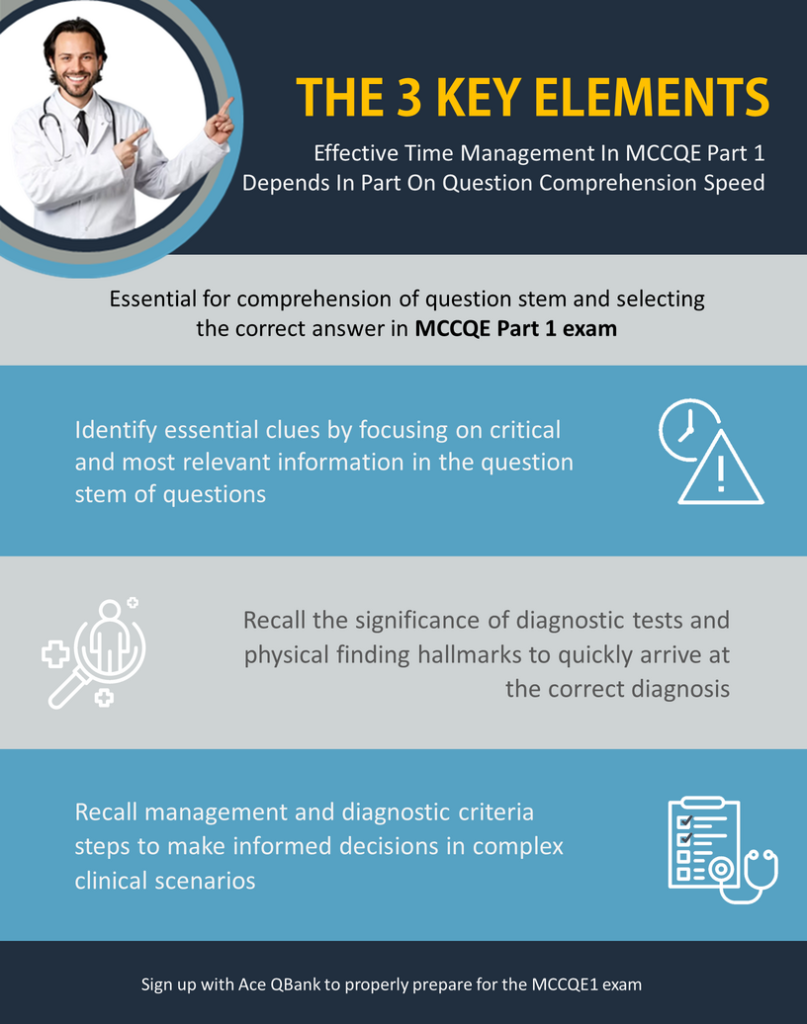
2. Diagnostic tests interpretation and physical finding hallmark:
Physicians often order the necessary lab work for patients to confirm or “rule out” certain medical conditions to narrow the differential diagnosis in a clinic or hospital setting. Sometimes, they order “gold standard” diagnostic tests to confirm the diagnosis.
On the other hand, in the board exam, laboratory results are tricky and challenging since you are literally receiving the result of diagnostic tests that you have not ordered, but you have been asked to make a decision based on the result. Therefore, it is essential to know the certain normal lab value by heart, the indication of each laboratory workup, the specificity of diagnostic tests for medical conditions, and the meaning behind the presence or absence of findings. This way, you will save tremendous time answering the questions.
Physical examination is vital in medicine. In board exams, you often see an image of physical findings along with the description in the question stem, or there will be a description of special maneuvers and results after performing the special maneuvers.
As you cover the MCC objectives, you should also look at the related clinical image to familiarize yourself with the clinical presentation. It is difficult to unsee the clinical picture once you understand what it signifies and what you need to do to appropriately manage and treat the patient. Having this knowledge will help you a lot in your career as a physician and ease the burden in a residency program and during the qualification exam, as sometimes, a look at a clinical image will tell you all you need to know.
Therefore, recalling the significance of diagnostic tests, physical findings, and clinical image hallmarks is equally important. The MCCQE1 exam is designed to test a candidate’s ability to apply their knowledge in clinical scenarios, and being able to recall the significance of diagnostic tests and physical findings will enable candidates to make informed decisions and arrive at the correct diagnosis in the shortest time possible.
The speed at which you answer questions on the qualification exam can significantly impact your time management during the test. However, with adequate preparation, you can improve your ability to quickly analyze the questions and increase your chances of success.
3. Diagnostic criteria and Management steps:
Recalling critical diagnostic criteria and management steps is essential. The exam will often present candidates with complex clinical scenarios that require a detailed understanding of diagnostic criteria and management strategies.
The “diagnostic criteria” in the exam are designed to evaluate the medical knowledge and understanding of common medical conditions, their ability to make diagnoses and manage patients, and the skills required to practice medicine.
Flow charts are an effective way to study management steps for the exam because they help you identify key steps and relationships between concepts and visualize and remember complicated processes that you may encounter in practice or on the exam.
Flow charts have become much more important on board exams in recent years because they allow the examiner to observe a candidate’s problem-solving skills by looking at how they approach and understand the steps in managing various diseases.
You can find diagnostic criteria and flow charts in good medical textbooks and some high-quality board review books. However, Ace QBank has all the relevant diagnostic criteria and flow charts for essential management steps to help you have a firm grasp of these critical elements and confidently approach even the most challenging questions on the MCCQE part 1 exam.
Preparing for the Canadian qualification exam can be a daunting task. As a medical student, you have to juggle between classes, clinical rotations, and studying for the exam. To make sure you are well-prepared to tackle the exam, you need to practice applying the concepts you have learned in a timely and efficient manner. This is where the Qbank (active learning approach) comes in.
By using proper Qbank, you can practice applying what you have learned in medicine in a timed setting. Using a high-quality Canadian question bank like Ace QBank will help you put what you’ve learned to use in a simulated setting. This is because the questions are based on the Medical Council of Canada’s (MCC) objectives as well as Canadian guidelines and recommendations. This helps candidates develop the problem-solving skills they need to pass the exam.
Not only will you be able to practice applying the medical concepts you have learned, but the questions in the Qbank also provide an in-depth explanation of a particular MCC objective being tested. Pay close attention to how the questions are constructed and the MCC objective being tested, as this can help you better understand the MCC objective and the concepts behind them, which can help you score better on the actual exam.
Ace QBank is the Canadian Qbank that provides an excellent active learning environment for medical graduates to practice and prepare for the exam. Using the Qbank is also a perfect way to improve your comprehension skills, as you will be asked to answer questions that require more than just the basic recall of fundamental scientific concepts. If you are a medical student, you can use Ace QBank to practice and prepare for the MCCQE1 exam.
Comprehension of a question stem on the MCCQE1 exam relies on identifying essential clues, recalling the significance of diagnostic tests and physical finding hallmarks, and recalling critical diagnostic criteria and management steps. Ace QBank helps you master these three elements to achieve the competence and expertise needed to pass the exam with flying colours.
Start practicing today and give yourself the best chance of success on exam day!
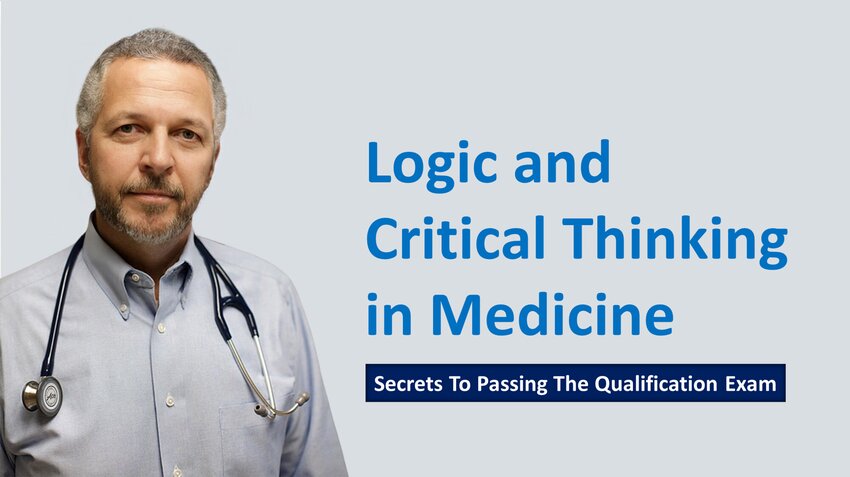
How Does Critical Thinking Affect MCCQE1 Time Management?
“Critical thinking.” is a term that goes back to the ancient Greek philosopher Socrates and the meaning has changed over the years, but at its core, it will always be the pursuit of proper judgment.
Nevertheless, having strong critical thinking skills is an essential trait for physicians, especially when it comes to managing patients effectively and efficiently.
Physicians who possess strong critical thinking skills can analyze patient data, evaluate the significance of clinical findings, and make informed decisions about diagnosis and treatment options. This allows them to approach clinical scenarios with greater confidence and make quicker decisions that result in better patient outcomes.
Physicians with well-developed critical thinking skills can identify the most important aspects of the patient’s clinical presentation, recognize any potential red flags, and implement appropriate diagnostic and treatment strategies. They are also able to identify and address potential complications, anticipate patient needs, and provide timely interventions when necessary.
In contrast, physicians who lack strong critical thinking skills may struggle to identify the most critical information in a patient’s presentation, leading to delays in diagnosis and treatment and potentially harmful medical errors. Due to the high stakes setting and possibility for irreversible harm, the Medical Council of Canada and the College of Family Physicians and Surgeons prioritize critical thinking in healthcare.
In today’s fast-paced healthcare environment, time is of the essence, and effective patient management is crucial. Physicians can enhance their ability to manage patients efficiently by refining their critical thinking skills. With improved critical thinking skills, medical graduates preparing for the MCCQE1 exam can tackle clinical vignettes more swiftly and effectively, enabling them to manage their time better and increase their chances of exam success.
How Can Critical Thinking Improve Time Management in MCCQE Part 1?
Critical thinking is a skill that can be taught and developed. Qbank can help you develop and improve your critical thinking and clinical decision-making as you will be looking for relevant information and able to process the clinical clues in the question stems faster before sitting for the MCCQE Part 1.
Questions in Ace QBank are high-yield and designed to engage the candidates who are preparing for the MCCQE1 exam and inspire them to think critically. By answering these questions and scenarios, medical graduates can improve their critical thinking skills and confidence and better prepare themselves for the exam.
The high-yield questions and top-notch clinical scenarios in Ace QBank have been carefully curated to cover all the key topics and concepts that are likely to be tested on the exam. The evidenced-based medicine approach is also used to provide in-depth, concise explanations for the questions, which are constantly updated to provide a reliable resource for MCCQE part 1 preparation. By practicing with these questions and scenarios, medical graduates can improve their test-taking skills and better understand the exam format.
Furthermore, Ace QBank has taken an evidence-based medicine approach to the design of its questions and scenarios. This means that medical graduates can be confident that they are learning from reliable and credible sources, which is essential for their success on the MCCQE1 exam.
It is unnecessary to mention that time management is crucial during the MCCQE1 exam, and 210 multiple-choice questions need to be answered within four hours. Therefore, it is essential to have a solid plan and a systematic approach to answering the questions. Candidates with strong critical thinking skills can quickly analyze the question, identify the critical clues, and recall the necessary diagnostic criteria and management steps to arrive at the correct answer within the allotted time.
On the other hand, candidates who lack critical thinking skills may struggle with time management during the exam. They may spend too much time analyzing irrelevant information or struggling to recall critical diagnostic criteria and management steps. As a result, they may not be able to answer all of the exam questions within the allotted time.
The MCCQE Part 1 exam is designed to assess a candidate’s ability to apply learned medical knowledge in a clinical setting. Therefore, candidates with strong critical thinking skills can better manage their time during the exam. They can quickly analyze the question stem, identify essential clues, recall critical diagnostic criteria and management steps, and arrive at the correct answer quickly.
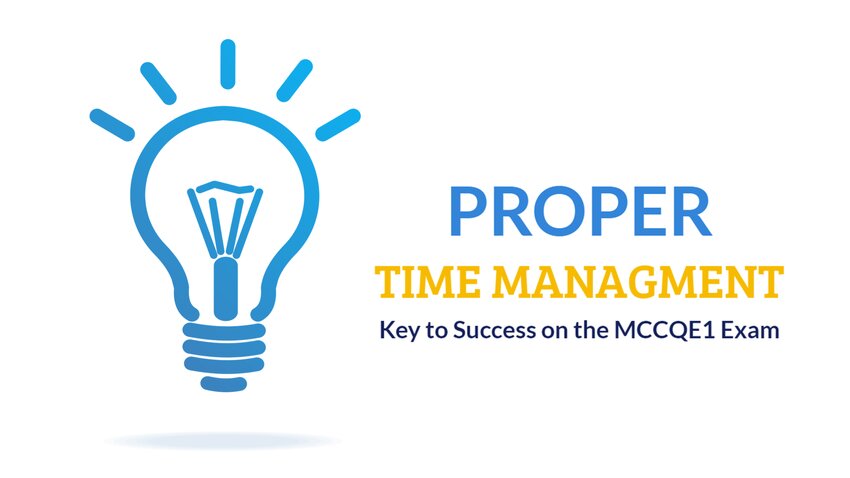
MCCQE Part 1: Tips for Improving Your Time Management
Tip #1: Guessing The Correct Answer
When struggling with questions. An educated guess is the best approach, and move on to the next questions since there is no penalty for giving the wrong answer. An educated guess is not a perfect solution to answering questions, but it can help increase the chances of a candidate getting the correct answer. However, it is advisable to eliminate all obvious wrong answers first, then speculate between the remaining options. Doing so increases the chances of selecting the correct answer to the question. Although many people think that guessing is not a suitable method of answering exam questions, it can be a wise decision in certain circumstances. In fact, guessing can be beneficial in these situations, as the candidate has nothing to lose and potentially a lot to gain. So, Do Not Leave Any Question Without an Answer on the MCCQE1 exam.Tip # 2: Avoid Reading Into The Question
Avoiding reading into the question in the MCCQE1 exam is essential because it can lead to confusion and incorrect answers. When you read into a question, you may assume that it is asking something it is not, or you may misinterpret important details that could affect your answer. The exam questions are designed to be clear and straightforward, and it’s important to answer them based on the information presented rather than making assumptions or trying to read between the lines. On the other hand, reading into a question can cause you to spend too much time on one question, which can lead to problems with time management and prevent you from answering other questions on the exam. MCCQE Part 1 is designed to test your knowledge and understanding of medical concepts, not your ability to interpret complex or ambiguous questions. It is vital to skim each question carefully during the exam, focusing on the specific details and avoiding assumptions or jumping to conclusions. This will help you avoid reading into the questions. Take the time to understand what the question is asking, and if you are unsure, flag the question and move on. In addition, you should maintain your focus during the exam, as this will allow you to keep your thoughts organized and prevent you from misunderstanding the questions. Remember that the MCCQE part 1 is designed to test your knowledge and critical thinking skills, so take your time, stay calm, and trust in your abilities to answer each question accurately.Tip # 3: Long Question Stem
Answering multiple-choice questions (MCQs) correctly and at a consistent pace during an exam is difficult, and MCQs with a long stem make it even more difficult. To save time, candidates frequently avoid answering these questions or flag them to be returned at the end. However, there is a strategy you may use to assist you in effectively tackling these questions:1. Read the first two lines of the question stem:
The exam is clinically oriented, and reading the entire question stem takes time. So, read the first two lines of the question stem and pay close attention to the chief complaint, age, and gender.2. Read the last line of the question stem:
This might assist you in avoiding misunderstandings and ensuring that you understand the question.3. Skim the answer choices:
Quickly look over the answer choices to see which ones are obviously wrong and get rid of them.4. Skim the Question Stem:
Look for the key points and clinical clues based on the remaining answer options; this can help you avoid getting bogged down in irrelevant details and focus your attention on the most important information. It takes practice and a thorough understanding of the MCC objectives to use this strategy. On the other hand, keep in mind that effective time management is vital for the MCCQE1 exam, so if you find that a question is taking too long, consider flagging it and moving on to the next one. You can always come back to the question later if you have time.Tip # 4: Avoid Selecting The Answer Option That Is Familiar To You:
It can be tempting to select the answer choice that you are most familiar with during an exam. After all, it’s comforting to be able to answer a question quickly and even more so to be confident in your answer. However, comfort and confidence should not be your main priorities in the clinical setting—accuracy should. Instead of going with the answer you know, it’s important to look at the clinical clues in the question. These clues are important in helping you choose the best correct answer for the particular clinical vignette you’re presented with. Even if the answer option you are most familiar with isn’t the best fit for the clinical clues, choosing the answer that matches them is important. This can be a difficult task and may require a bit of bravery on your part, but it is important to remember that selecting a probable answer is better than aiming for assurance. In the long run, accuracy is more important than comfort.Tip # 5: Get enough sleep
Getting enough sleep before the exam is crucial for optimal performance. Sleep is essential for memory consolidation and increasing cognitive processes such as attention, alertness, and problem-solving. Getting adequate sleep before the exam can help you perform better and remember the material you have studied. On the other hand, Lack of or poor sleep can cause fatigue and affect your ability to concentrate, make decisions, and remember accurate information, all of which are essential for exam success. It is essential that you have a good night’s sleep in the days leading up to the MCCQE1 exam to ensure that your cognitive function is optimized. Try to sleep for at least 7-8 hours of sleep per night and stick to a consistent sleep schedule to feel rested and alert on exam day.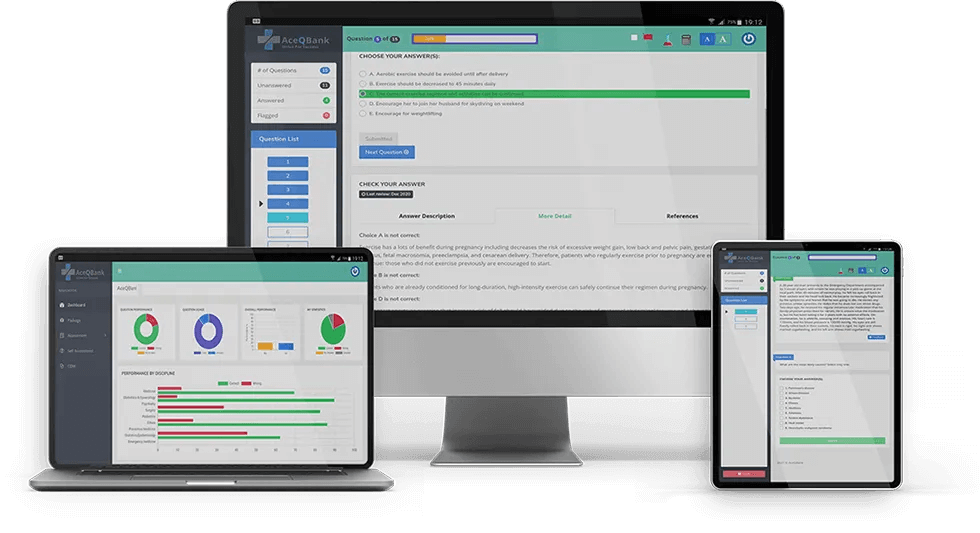
How Can Ace Qbank Help With MCCQE1 Time Management?
Customizable Questions:
Ace QBank offers a personalized study experience that can help you optimize your study time and focus on areas where you need improvement the most. With the ability to create custom question blocks, you can tailor your study plan to your unique needs and preferences. This feature allows you to select the topics you want to focus on and set the pace that works best for you. By doing so, you can study more efficiently and effectively, ensuring that you are adequately prepared for the MCCQE1 exam.Timed Practice Exams:
Time management is essential for success on the MCCQE Part 1 exam, and taking timed practice exams is a crucial part of developing this skill. With Ace QBank, you can easily simulate the time constraints of the actual exam through time study mode, and custom question blocks can be created and completed under timed conditions. This approach allows you to practice proper time management techniques and get a sense of how much time you should allocate to each question. By practicing with timed exams on Ace QBank, you can improve your ability to manage time efficiently during the actual exam and increase your chances of success.Detailed Explanations:
Ace QBank provides detailed explanations for each question and answer based on evidence-based medicine, which can help you understand the material more efficiently. This feature can be especially helpful for those who need to improve their understanding of a specific topic or concept. By having a better grasp of the material, you will be able to answer questions more quickly and confidently, which can ultimately save you time during the MCCQE1 exam. Plus, with the ability to review explanations and rationales, you can reinforce your knowledge and identify any knowledge gaps that may require further attention. Ace QBank’s comprehensive explanations provide a valuable resource for medical graduates to not only pass the exam but also build a stronger foundation of knowledge in preparation for their medical careers.Simulation of Exam Environment:
Preparing for the MCCQE1 exam can be stressful, but Ace QBank can help ease that stress by providing self-assessments that simulate the exam conditions. These self-assessments are designed to help candidates in better understanding how to manage their time during the actual exam. By practicing in an environment that closely resembles the exam, candidates can develop the confidence and skills needed to succeed on test day. Furthermore, Ace QBank’s self-assessments are unique, and questions are distinct from the main question bank to accurately assess the readiness of the candidates. By taking these assessments, candidates can identify areas where they may need to focus their studies, as well as track their progress over time. This helps candidates to make the most of their study time and focus on areas where they need the most improvement. Overall, Ace QBank self-assessments and detailed explanations can help candidates to evaluate their test-taking skills and preparedness for the exam and increase their chances of success on test day.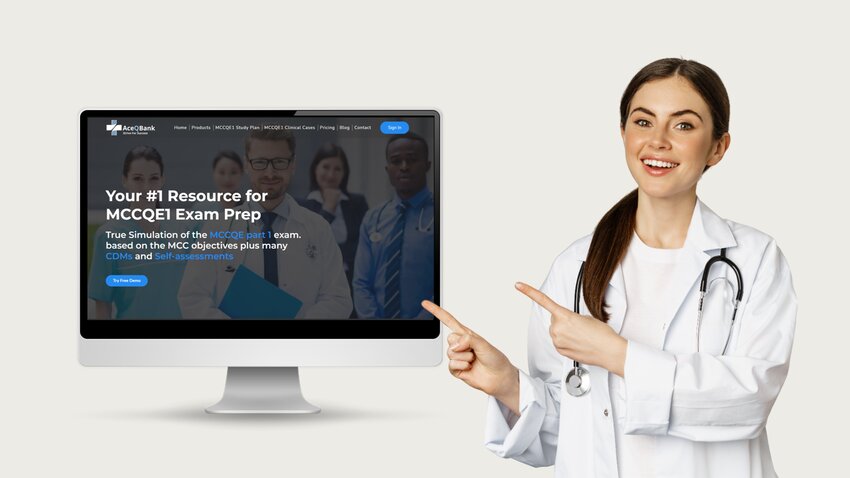
How To Maximize Your Success on the MCCQE Part 1?
Proper preparation is the cornerstone of success on the MCCQE Part 1 exam. It is imperative that you do everything in your power to achieve the highest possible score and, most importantly, pass the exam on the first attempt. The MCCQE Part I exam is designed in accordance with CanMEDS and is based on MCC objectives. Therefore, the most effective way to prepare for the exam is to use a question bank that is specifically designed to cover these objectives.
Successful test takers understand that nothing can replace the importance of thorough preparation. When it comes to taking qualifying exams, preparation is the key to success. It is not just about passing the exam but also about earning the maximum possible score. That’s where Ace Qbank comes in, the number one question bank for MCCQE1 exam questions, providing you with the best chance to cover all MCC objectives with high-yield questions.
Ace QBank is the only Canada question bank designed based on the Medical Council of Canada objectives and has over 2,500 questions designed to prepare you for the first part of the exam. Additionally, we have 140 Clinical Decision-Making (CDM) cases for the second part of the exam, along with two self-assessments to help you gauge your readiness before taking the exam.
What sets Ace Qbank apart is the quality of questions that have been designed to guarantee excellent results, so you can feel confident as you prepare for your exam. Many summary tables, outstanding flowcharts, and detailed explanations for all question options. Top-notch clinical decision-making (CDM) helps to distinguish us and makes us the number one question bank for the MCCQE1 exam in Canada.
The MCCQE Part 1 exam is known for its difficult, clinically oriented questions, but Ace Qbank can help you rise to the challenge. Question bank in-depth explanations of correct and incorrect answers, flowcharts, and summary tables will help you better comprehend medical concepts and improve your chances of success.
Ace QBank offers everything you need to prepare for the exam in one place. With high-yield questions and top-notch clinical cases, you can rest assured that you have access to the best possible study materials. Don’t leave your exam success to chance; choose Ace Qbank for the most effective and comprehensive preparation for the MCCQE1 exam.
Sign up for the Ace Qbank demo today and see the difference for yourself!


